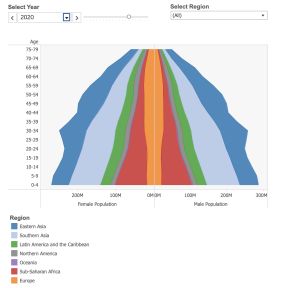
Environment
All human thinking and behavior unfolds within one of countless physical environments with distinct characteristics. From noisy, crowded offices to quiet, open fields, from one’s private bedroom to the whole of the natural world, the environment can be dissected at multiple levels, each of which has important connections to psychology.
Among the consequential links between the environment and the mind are those between the qualities of certain environments (most notably natural settings) and well-being, as well as the psychological relationship between individuals and their threatened natural environments.

Environmental psychology is a branch of psychology that explores the relationship between humans and the external world. The influence of natural and human-built surroundings on how people feel, think, and behave is a major focus of research in the field.
Environmental psychology focuses on a variety of physical spaces inhabited by people, including both human-built and natural ones. These can include relatively small-scale environments, such as a classroom, a home, or a public park, as well as larger-scale spaces such as schools, hospitals, or neighborhoods. (In other areas of psychology, the term “environment” is often used in a different way, to broadly refer to non-genetic factors that lead to individual differences.)
Important subjects in environmental psychology include the negative or positive effects of spaces on people who inhabit them: for example, the impact of environmental stressors like noise or crowding; the restorative effect of natural environments; and the features associated with increased well-being, performance, or other measures in places like offices, homes, schools, and neighborhoods. Environmental psychologists also study personal space, privacy, and the sense of ownership of spaces, how people can better navigate environments, why certain environments are preferred to others, and what motivates concern for the environment and environmentally friendly behaviors.
Environmental psychology's findings on how people evaluate and respond to the environment are relevant to domains with broad and lasting influence, including city planning, architecture, landscape design, and environmental sustainability. Insights from the field can help reveal how changes in the way humans use their environments, and how environments are constructed, could improve people's lives on individual and population-wide levels.

Even in an increasingly urbanized world, the natural environment is deeply important to the human species. In addition to providing space to explore, play, and relax with minimal interference, nature appears to have positive effects on mental health. Whether people get their dose of the outdoors on a trek through the wilderness or a jog through the city park, research suggests, we should not overlook its potential as a psychological salve.
Time spent in natural environments and proximity to green space (such as an urban park) have been associated with measures of well-being—including lower anxiety and depression symptoms—in a number of studies. Researchers have found evidence that time in natural environments can lower blood pressure and levels of the stress hormone cortisol. Some informally refer to “nature therapy” or “vitamin N” to highlight nature’s potential benefits.
People may not need not go on extended hikes to see psychological gains from time in nature. Researchers found that spending just a couple of hours per week in green spaces was associated with higher self-ratings of health and well-being. Time in nature can encourage exercise, which itself has benefits for well-being, but the finding held even for those who reported little or no exercise.
Exposure to nature is one of the most well-recognized sources of positive feelings of awe. While many aspects of nature can instill wonder, psychologists have theorized that a key element in the psychology of awe is the experience of vastness—a sense that something is larger than one’s self or one’s ordinary experience—a quality of natural scenes such as mountains, oceans, redwood forests, and star-filled skies.
Forest bathing, or Shinrin-yoku, is a practice popular in some East Asian countries that involves an immersive and mindful experience in nature. Those who traverse forest environments as part of this practice are encouraged to attend to them with each of the five senses. As with other forms of nature exposure, forest bathing has been studied for its potential effects on well-being, such as reduced feelings of anxiety and improved mood.
There are probably multiple reasons why people are drawn to a tree-filled park or a lakeside more than a parking lot or a windowless basement, including the relative calm, fresh air, or sunlight they afford. But scientists have theorized that present-day environmental preferences have been shaped by human evolution and reflect the natural surroundings in which our ancient ancestors thrived. There’s even a term for humans’ attraction to the natural world: biophilia.
Some of the changes recommended by experts involve mimicking aspects of the natural world that humans find comforting. Ways to build a happier home may include, for example, the use of natural surfaces (like wood), relatively high ceilings, and windows with views of nature. Two preferences theorized to be based on evolution are the desire for refuge (a sense of being sheltered from threats) and the desire for prospect (a sense of being able to monitor the environment). Spaces that deny people prospect and refuge—like offices that leave workers exposed and with restricted views of their own—are more likely to make us miserable.

As global temperatures and sea levels rise, changes in the environment are poised to affect human well-being in complex ways. Scientists have begun to explore the potential for negative impacts on mental health over time. Given the role of human-caused carbon emissions in the global climate crisis—and a lack of coordinated action to address it—there are a variety of ways in which ideas from psychology could be helpful in mitigating and coping with the effects of climate change.
Psychology highlights cognitive tendencies that may be relevant for promoting action on climate change, or that will need to be taken into consideration. For example, concrete experiences are often more psychologically impactful than abstract statistics and trends, so conveying such experiences as they relate to the effects of climate change may have a stronger influence on support for new policies. Another such tendency is discounting the costs and benefits of future events relative to more immediate ones—something that might be addressed by drawing attention to climate change impacts that are already evident.
While it is difficult to predict exactly how any specific psychological effects of climate change will play out, research suggests that rises in average temperatures are associated with increases in self-reported mental health problems. Other effects of climate change—such as more frequent and severe storms and hurricanes—could cause large-scale spikes in distress. Gradual changes such as increased dislocation and resource scarcity may also pose threats to mental health.
Resistance to the scientific consensus on human-caused climate change may be due in part to a motivated bias against evidence supporting a possibility that one would rather not be true. The magnitude of the threat posed by climate change may be another psychological reason for denial. Ideology and social identity likely bias individuals toward viewpoints on climate change—including the view that it’s a hoax—that are held by others in their political and social in-groups.
The most severe of the predicted consequences of climate change are due years into the future—and for many people, a problem that is “out of sight” all too easily slips “out of mind.” Calls to take action to mitigate climate change may prompt feelings of helplessness, or apprehension about the sacrifices that people think they will be expected to make (such as lifestyle changes to reduce their carbon footprint). Nevertheless, data suggest that in the past decade, the portion of Americans who acknowledge climate change and feel worried about it has increased substantially and now includes a majority of the population.
Pointing the person to evidence from broadly respected sources on the risks of human-caused climate change is one obvious way to respond. But this approach has its shortcomings—people frequently defend their pre-existing beliefs by questioning, discounting, or ignoring evidence. One alternative to emphasizing the reality of climate change to those who deny it is to highlight short-term problems with sources of greenhouse gas emissions (such as air pollution or health risks). It may help to follow general guidelines for talking to someone with whom you disagree—such as avoiding personal attacks, sarcasm, and condescension, expressing basic respect, and not assuming suspect motives.














